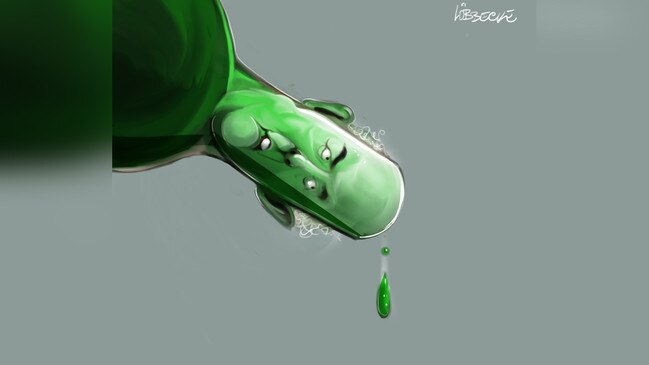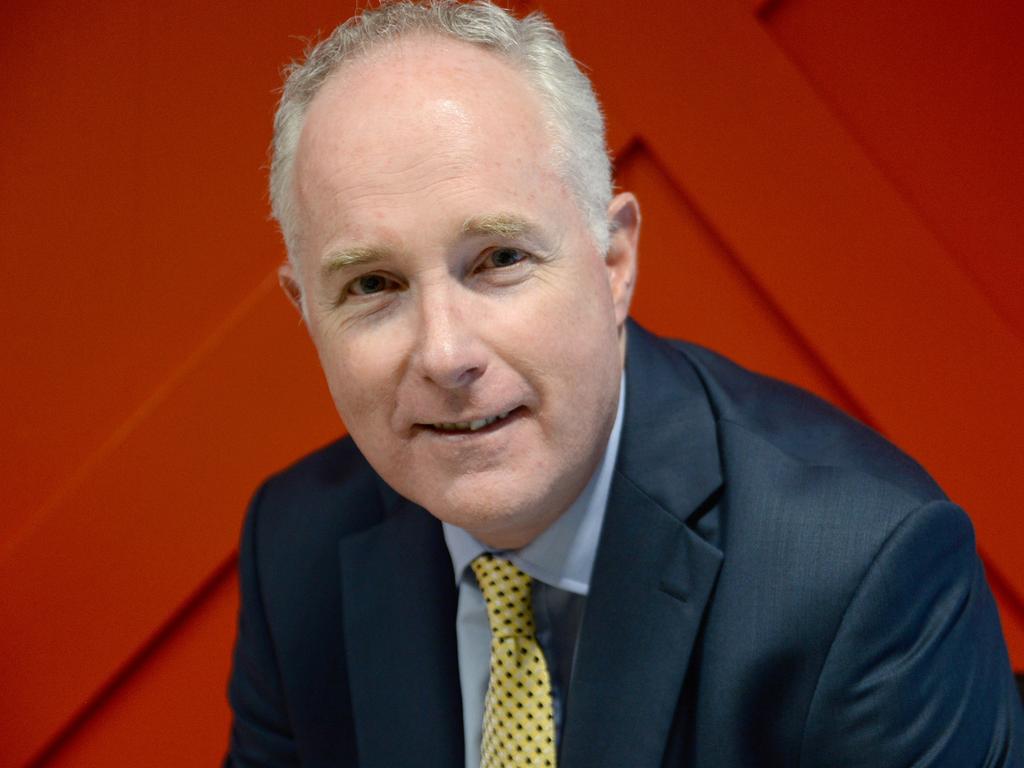
In a stellar six-year run at the wine company, Clarke has managed to convince the market he was doing enough good things to offset external negatives. Earnings per share over the past five years increased from 21.9c to 60.4c and return on capital from 6.8 per cent to 14.9 per cent.
The bubble has now burst and the great man’s mortality is revealed.
External events such as a structural change in the US towards more private-label wine and the potential threat of the coronavirus in China now loom larger than his magic wand can move.
When he tells analysts he knows the answers, the market is waiting to see the evidence.
When on a roll, Clarke used to talk the stock price up to counter any negative news, but on Wednesday the more he talked the more it fell. The Michael Clarke magic propelled Treasury Wine Estates’ share price up some five times in six years, but on Wednesday he gave back some — or, to be precise, close to $3bn — as the stock fell 25 per cent to $12.55.
The share price fall is an over-reaction to Tuesday’s profit warning based around the company’s underperforming US operations, but that simply underlines the point around his shattered aura.
Since turning the company around, Clarke has walked on water as far as investors were concerned — but this bubble was bound to burst at some point. And it clearly has now on the eve of the great man handing the baton to Tim Ford in the September quarter this year.
Both Clarke and Ford blamed a structural change in the US for the profit warning, but the fact is the group now has had four CFOs in four years and a third US boss in the space of 18 months.
Personal reasons were cited for the recent decision of nominated US boss Angus McPherson to stay at home in Australia, but there is something about the Clarke management style that clearly has some issues.
McPherson was replaced this year by US veteran Ben Dollard as the company embarks on yet another review of its commercial wine division’s weak US performance.
Clarke says he knows what to do but continuous disclosure laws prevent him from saying anything. So instead we have a review, which at one point in his rein would have worked but right now sounds like more marketing bull.
The reality is, with the exception of the US, the company is travelling well and veteran analyst David Errington asked just how long it would persist with its loss-making love affair with the US.
Since 2000, when then Foster’s boss Trevor O’Hoy spent close to $3bn buying Beringer from private equity, the US has always proved too hard to manage.
Throw in a couple of acquisitions and the investment now is more like $6bn — but much more in terms of wasted man hours.
TWE bought forward its results release on Wednesday in a failed attempt to talk around its US-inspired earnings downgrade and show that the company was going OK.
America’s earnings fell 17 per cent to $98.3m, against a 19 per cent increase in Asian earnings to $5.5m, a 10 per cent increase in Australia to $85.9m and 1 per cent decline in Europe to $32m.
The structural shift cited was a move to private equity in the US, particularly in the low-end product ranges below $10 a bottle.
This is called commercial wine, between $10 and $15 is called masstige and above $25 a bottle is called luxury.
Clarke has the top two sectors covered outside the US, but needs to cut costs and supplies in the bottom end that come from third-party suppliers.
Asia is still the earnings star and continues to grow even if Clarke said it was too early to say what impact the coronavirus would have on the business.
It won’t be a positive.
Clarke has said he will step away in September and had hoped for a European acquisition ahead of that. But Wednesday showed the market’s love affair with the great man has officially ended.
Iluka shorters suffer
Iluka’s Tom O’Leary enjoyed the reverse impact in the market of a production report that didn’t disappoint after a couple of misses.
This took the shorts to the cleaners and Iluka’s stock price was up 7.1 per cent at a six-month high of $9.51.
Huawei’s UK boost
Huawei Australia has received a boost in its campaign to overcome Australia’s ban on its equipment in the multi-billion-dollar 5G rollout after Britain agreed to its limited use in networks.
In a decision on Wednesday, the UK will allow Huawei up to 35 per cent of the British market, where it competes with Ericsson and Nokia.
The company will be banned from sensitive sites such as military installations and nuclear power stations.
However, the decision, on the eve of Friday’s Brexit, represents a snub to the US, which tried to talk the UK into banning Huawei on security grounds.
Australia followed the US lead in 2018 on the urgings of Home Affairs Minister Peter Dutton.
No matter what Australia does, the UK decision opens the way for other countries, from Germany to New Zealand, to let Huawei into their market.
Former prime minister Malcolm Turnbull has argued you can’t separate the so-called network core from transmission, but the UK has rejected this argument.
US Secretary of State Mike Pompei visits the UK on Thursday, when he is expected to express his disappointment at the move.
Huawei Australia is mounting a final lobbying campaign to overturn the Australian ban.
In a statement, it said it “warmly welcomes the decision by the United Kingdom government, led by Prime Minister Boris Johnson, to allow Huawei to continue supplying its world-leading 5G technology to UK mobile network operators. “This decision means that — in line with the publicly expressed wishes of Prime Minister Johnson — the British people will get access to the world’s leading 5G technology that will help spur the UK’s digital economy and foster greater innovation.”
Company spokesman Jeremy Mitchell said: “This decision by the UK government proves beyond doubt that there is a way to manage security on 5G networks without excluding vendors simply for being from a certain country.
“It also demonstrates that the Turnbull government was given incorrect advice that the core and radio networks cannot be separated on 5G — that is completely incorrect as the UK operators are now doing it in the real world.”
Mr Mitchell said “by comparison, here in Australia we will all be paying more for inferior 5G technology and millions will wait much longer to get 5G or miss out altogether — especially in rural and regional Australia.”






The aura around Michael Clarke was shattered on Wednesday with Treasury Wine Estates’ stock price falling to near three-year lows after another profit downgrade and the realisation that the magic man’s wand has lost its powers.